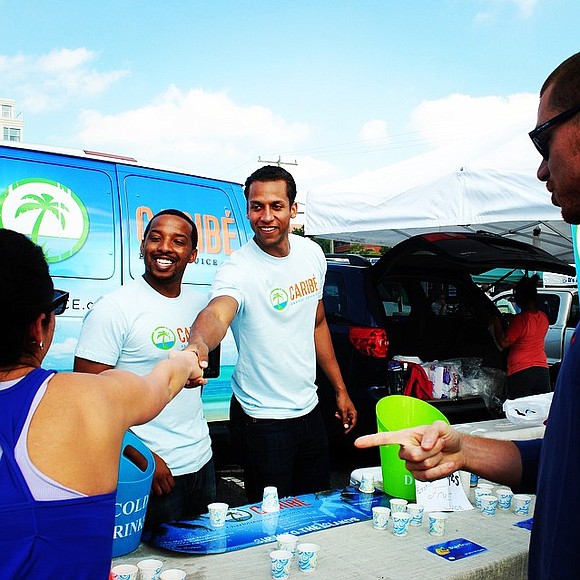BALTIMORE — Luis Solis is described by those who work with him, and for him as a passionate and dedicated leader, who has pours his heart and soul into all things Caribé.
The Baltimore resident has done his due diligence, researching and discovering that in America, a mango can cost more than $2 at a grocery store but in his native Dominican Republic, small farmers are leaving the fruit laying in piles to rot because they have no one to sell it to.
Solis is working to change the plight of farmers in his home country with Caribé Exotic, his new juice startup business that sources its tropical fruits directly from tiny farms on the island that would otherwise have no way of earning a profit.
“Our goal is to eliminate the middle man. We want to be sourcing fruits directly from farmers at a fair price and turn it into a product that has demand in the United States,” Solis said. “That is what our brand is about, we want to be able to replicate that system in other countries. However, in order to do this, we have to build a demand for our brand in the United States as well as awareness.”
The story of Caribe began when Solis said he noticed juice offerings did not match the quality flavor or experience he and his business partners had grown accustomed to drinking when living in the Dominican Republic, where natural, fresh tasting, nutrient packed juices are a cultural staple.
Today, the company offers a portfolio of cold pressed juices made from exotic fruits, all of which are sourced from the Caribbean which helps farmers sell their fruit abroad, giving them access to different markets they otherwise would not be able to reach.
The company operates primarily out of Washington, D.C. and Miami and its products can be found in places like Whole Foods Markets and Virginia’s Blue Ridge Country Store.
Solis says there are a few reasons why farmers in his native country are forced to leave fruit piles.
“The first being that the fruits that we source are not that common in the states and they do not have the market for it,” he said. “Second, a lot of the fruits require processing in order to make it safe for exporting and that is something that small farmers can’t afford to do. They sometimes end up selling to brokers for an extremely inexpensive price.”
Prior to starting Caribé Exotic more than two years ago, Solis says he spoke with a farmer who told him that he usually sells his mangoes for one to three Dominican pesos which is equivalent to two to seven cents in the United States.
“When comparing this to the United States where Mangoes are sold for $1 to $3, it gave me the inspiration to start the company,” he said.
Currently, the government of the Dominican Republic is working with farmers to create a consortium they hope will allow them to create leverage and negotiate better deals.
While that could take time, Solis said his company continues to look for ways to partner with the government to support farmers by helping them to obtain certifications that will allow them to compete in the international market.
For every bottle of juice Solis’ company sells, he donates 20 percent of the proceeds to small Dominican farmers— s funds they’d otherwise struggle to obtain.
The growth of his company has allowed Solis to buy the entire crop of fruit from some of the farmers, according to Solis.
“That is what our brand is about. It is our hope that we will create these opportunities for other countries,” Solis said. However, in order to do this, we have to build a demand for our brand in the U.S. as well as awareness. “It makes us extremely happy to see the smiles on the farmers’ faces when we give them these opportunities and help them succeed. ”
